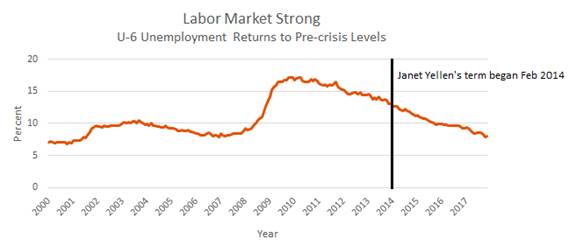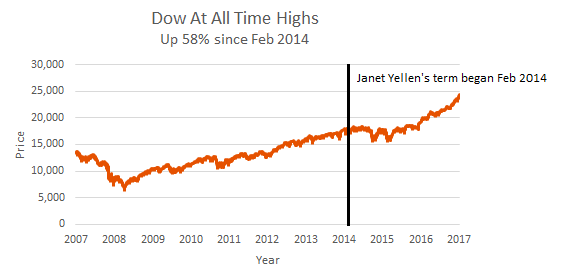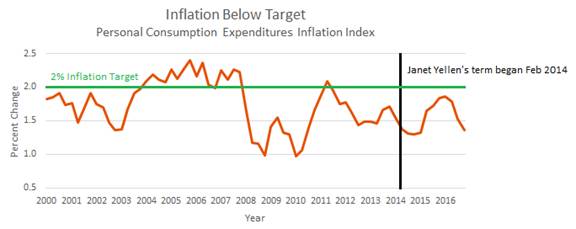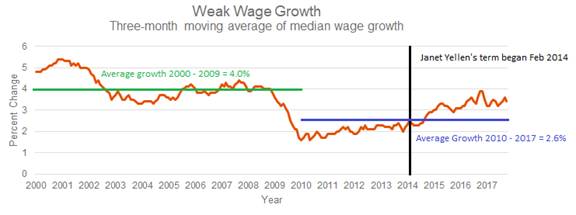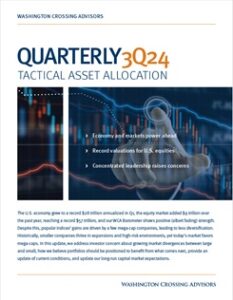Monday Morning Minute 121117
THE WEEK AHEAD
Janet Yellen leads her final Federal Open Market Committee meeting of 2017 and will hold her final Press Conference as Chair on Wednesday.
MACROECONOMIC INSIGHT
With Jerome Powell set to take the reins of the Federal Reserve (Fed) from Janet Yellen next year, we wanted to analyze Chair Yellen’s economic legacy and give an assessment of the economy that Mr. Powell will inherit.
Labor Market
Last Friday’s November Employment report showed that 228,000 jobs were added during the month and the unemployment rate, at 4.1%, has fallen to its lowest level since the early 2000s. Though this number grabs all the headlines, we wanted to look at another measure of the labor market, the U-6 rate. This metric includes people marginally attached to the labor market plus people who are employed part-time. As you can see in the chart below, the U-6 rate has returned to its pre-crisis levels.
Source: U.S. Bureau of Labor Statistics
Equity Markets
Equity markets have seemingly shrugged off Chair Yellen’s monetary tightening efforts. As you can see in the chart below, the Dow Jones Industrial Average has climbed to all-time highs, rising approximately 58% during Yellen’s time as Chair.
Source: S&P Dow Jones Indices
Inflation
It has been five years since inflation reached the Fed’s preferred level of 2%. Throughout her time as Chair, Yellen held firm to the thought that a tightening labor market would eventually push inflation higher. However, as the chart below displays, that has not been the case. Inflation remains below the 2% target.
Source: U.S. Bureau of Economic Analysis
Wages
Wage growth has been surprisingly weak compared to the early 2000s, but has risen during Yellen’s time as Chair. The Atlanta Fed’s wage tracker (chart below) focuses on continuously employed workers and presents a more bullish number than the Average Hourly Earnings of All Employees released by the U.S. Bureau of Labor Statistics (approx. 2.5%).
Source: Current Population Survey, Bureau of Labor Statistics
The history books will show that under Janet Yellen employment grew, the stock market rose, wages ticked up, and inflation remained low and stable.
ECONOMIC DATA THIS WEEK
| Date | Report | Period | Survey | Prior |
| Monday, Dec 11: | JOLTS | Oct | — | 6,093 |
| Tuesday, Dec 12: | FOMC Meeting Begins | |||
| PPI Final Demand M/M | Nov | 0.4% | 0.4% | |
| PPI Ex Food & Energy M/M | Nov | 0.2% | 0.4% | |
| PPI Ex Food, Energy & Trade M/M | Nov | 0.2% | 0.2% | |
| PPI Final Demand Y/Y | Nov | 3.0% | 2.8% | |
| PPI Ex Food & Energy Y/Y | Nov | 2.4% | 2.4% | |
| PPI Ex Food, Energy & Trade Y/Y | Nov | — | 2.3% | |
| Monthly Treasury Budget Statement | Nov | -$135B | -$63.2B | |
| Wednesday, Dec 13: | FOMC Meeting Ends | |||
| CPI M/M | Nov | 0.4% | 0.1% | |
| CPI Ex Food & Energy M/M | Nov | 0.2% | 0.2% | |
| CPI Y/Y | Nov | 2.2% | 2.0% | |
| CPI Ex Food & Energy Y/Y | Nov | 1.8% | 1.8% | |
| Thursday, Dec 14: | Weekly Jobless Claims | Dec 9 | — | 236K |
| Retail Sales M/M | Nov | 0.3% | 0.2% | |
| Retail Sales Ex Auto M/M | Nov | 0.7% | 0.1% | |
| Retail Sales Ex Auto & Gas M/M | Nov | 0.3% | 0.3% | |
| Import Price Index M/M | Nov | 0.8% | 0.2% | |
| Import Price Index Y/Y | Nov | — | 2.5% | |
| Export Price Index M/M | Nov | — | 0.0% | |
| Export Price Index Y/Y | Nov | — | 2.7% | |
| Business Inventories | Oct | -0.1% | 0.0% | |
| Friday, Dec 15: | Industrial Production M/M | Nov | 0.2% | 0.9% |
| Empire State Manufacturing Survey | Dec | 18.0 | 19.4 | |
| Source: Bloomberg |
ASSET ALLOCATION PORTFOLIO POSTURE
Based on shorter-term expectations, the “tactical” allocation within portfolios is overweight stocks versus bonds.
Client approved reports and commentaries click here
Kevin Caron, CFA, Senior Portfolio Manager
Chad Morganlander, Senior Portfolio Manager
Matthew Battipaglia, Portfolio Manager Suzanne Ashley, Analyst
(973) 549-4052
www.washingtoncrossingadvisors.com
—————————————————————————————————————————————————————————————————————————————-
Disclosures
WCA Fundamental Conditions Barometer Description: We regularly assess changes in fundamental conditions to help guide near-term asset allocation decisions. The analysis incorporates approximately 30 forward-looking indicators in categories ranging from Credit and Capital Markets to U.S. Economic Conditions and Foreign Conditions. From each category of data, we create three diffusion-style sub-indices that measure the trends in the underlying data. Sustained improvement that is spread across a wide variety of observations will produce index readings above 50 (potentially favoring stocks), while readings below 50 would indicate potential deterioration (potentially favoring bonds). The WCA Fundamental Conditions Index combines the three underlying categories into a single summary measure. This measure can be thought of as a “barometer” for changes in fundamental conditions.
The information contained herein has been prepared from sources believed to be reliable but is not guaranteed by us and is not a complete summary or statement of all available data, nor is it considered an offer to buy or sell any securities referred to herein. Opinions expressed are subject to change without notice and do not take into account the particular investment objectives, financial situation, or needs of individual investors. There is no guarantee that the figures or opinions forecasted in this report will be realized or achieved. Employees of Stifel, Nicolaus & Company, Incorporated or its affiliates may, at times, release written or oral commentary, technical analysis, or trading strategies that differ from the opinions expressed within. Past performance is no guarantee of future results. Indices are unmanaged, and you cannot invest directly in an index.
Asset allocation and diversification do not ensure a profit and may not protect against loss. There are special considerations associated with international investing, including the risk of currency fluctuations and political and economic events. Investing in emerging markets may involve greater risk and volatility than investing in more developed countries. Due to their narrow focus, sector-based investments typically exhibit greater volatility. Small company stocks are typically more volatile and carry additional risks, since smaller companies generally are not as well established as larger companies. Property values can fall due to environmental, economic, or other reasons, and changes in interest rates can negatively impact the performance of real estate companies. When investing in bonds, it is important to note that as interest rates rise, bond prices will fall. High-yield bonds have greater credit risk than higher-quality bonds. The risk of loss in trading commodities and futures can be substantial. You should therefore carefully consider whether such trading is suitable for you in light of your financial condition. The high degree of leverage that is often obtainable in commodity trading can work against you as well as for you. The use of leverage can lead to large losses as well as gains.
All investments involve risk, including loss of principal, and there is no guarantee that investment objectives will be met. It is important to review your investment objectives, risk tolerance and liquidity needs before choosing an investment style or manager. Equity investments are subject generally to market, market sector, market liquidity, issuer, and investment style risks, among other factors to varying degrees. Fixed Income investments are subject to market, market liquidity, issuer, investment style, interest rate, credit quality, and call risks, among other factors to varying degrees.
This commentary often expresses opinions about the direction of market, investment sector and other trends. The opinions should not be considered predictions of future results. The information contained in this report is based on sources believed to be reliable, but is not guaranteed and not necessarily complete.
The securities discussed in this material were selected due to recent changes in the strategies. This selection criteria is not based on any measurement of performance of the underlying security.
Washington Crossing Advisors LLC is a wholly owned subsidiary and affiliated SEC Registered Investment Adviser of Stifel Financial Corp (NYSE: SF).

